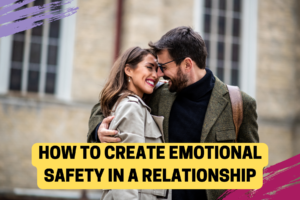Healthy communication is essential for a healthy relationship. In order to have better communication, though, there needs to be emotional safety within the relationship so that you both feel free to express yourselves.

What is Emotional Safety?
Have you ever been with someone and felt like you couldn’t share your thoughts or ideas about something because you were afraid of how they would react? This happens due to a lack of emotional safety.
Emotional security in a relationship is when both partners can be authentic, feel heard, and are comfortable sharing their feelings without fear of a negative reaction or judgment. Sadly, many people find that they don’t know how to feel safe in a relationship.
Emotional safety is that feeling of honesty, trust, and openness that comes from a healthy relationship.
6 Ways to Create Emotional Safety in Relationships
There are several ways for couples to foster emotional safety.
- Respect boundaries
- Be transparent
- Understand your partner
- Give positive feedback
- Practice compassion and empathy
- Support each other’s growth
1. Respect Boundaries
It is important to have a healthy conversation with your partner about what you are comfortable with in a relationship. Some boundaries are deal breakers, such as a partner cheating on you. Others may shift with time. For example, you may not be comfortable with intimacy now, but later down the line, you will be.
Boundaries can be physical, emotional, sexual, financial, spiritual, time-based, etc. Talking about boundaries as a couple can actually bring you closer together.

2. Be Transparent
You don’t have to share every single little thing about your life, but you should be honest with your partner. Let your guard down and don’t be afraid to be vulnerable.
3. Understand Your Partner
When having a conversation – especially a difficult one – many people listen just to respond. Instead of that, you should listen to understand your partner. Ask them questions and try to truly see things from their point of view. Approach conversations with curiosity instead of defensiveness.
4. Give Positive Feedback
Give more compliments to your partner than criticism. Let them know your appreciation for the little things they do. As a relationship goes on, compliments and flirting tend to die down a bit. Resentment builds when partners are overly critical of each other.
5. Practice Compassion and Empathy
Neither of you will be perfect all of the time – we are only human. In order to feel emotionally safe in a relationship, sometimes it’s important to give your partner the benefit of the doubt. When mistakes are made, agree to work through them and grow together.
6. Support Each Other’s Growth
You and your partner will both grow and change as your relationship goes on. It’s important to give each other space to explore your interests as individuals. Support each other’s dreams and be there for each other when needed.
6 Behaviors To Avoid
The following behaviors are a surefire way to kill emotional safety in a relationship.
- Absolute language
- Defensiveness
- Gaslighting
- Criticism
- Letting conflict build
- Trying to be right
1. Absolute Language
Avoid accusatory statements, and take the words “always” and “never” out of your vocabulary. For example, instead of saying “You never do the dishes!”, try saying “I feel frustrated and overwhelmed when you don’t do your housework.”
2. Defensiveness
It is not easy to hear negative feedback from someone we love, but being too defensive is a one-way ticket to your partner never opening up to you about anything. You can disagree with the criticism, but it is important to hear your partner out and be honest with yourself about the situation.
3. Gaslighting
If you made a mistake, own up to it instead of lying about it. Gaslighting is a manipulation tactic that makes the other partner question their own reality, and is a huge online dating red flag.
4. Criticism
You can bring up issues in the relationship without being critical or nagging. If your partner did something that bothered you, take some time to calm down before you say anything to them. Often when we give criticism, we are not getting to the root of the actual problem.
5. Letting Conflict Build
Tackle issues as they come up instead of letting it all build inside your head until you can’t stand it anymore. Bottling it all up will only lead to an explosive fight.
6. Trying To Be Right
Let go of the need to be right all of the time. It’s not good for your relationship because the other person will feel like their opinions do not matter. It’s not good for you either, because it stunts your ability to grow and learn. Plus, odds are that you are definitely not right all of the time.
Emotional Safety in Relationships Takes Work
The only relationships you should be in are the ones that build emotional safety. For more relationship advice, visit our growing online resource for dating safety tips.


Leave a Reply